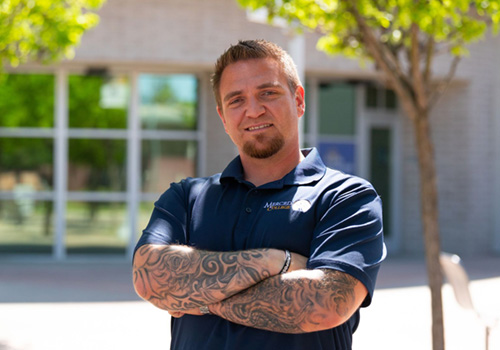 Cory McCullough was at the skate park, watching several of his and his fiancée Ashley’s six children roll around.
Cory McCullough was at the skate park, watching several of his and his fiancée Ashley’s six children roll around.
While taking a break from studying sound wave propagations, he explained how he had become a UC Merced Ph.D. candidate, a Merced College mathematics instructor, a convicted felon, a father and a drug addict, all by age 33.
But not in that order.
McCullough—who now teaches statistics for the robust Merced College prison education program called Rising Scholars—told of how he’d served roughly a year in prison, covering several stays for burglary, which had financed his drug habit.
“And then I didn’t figure out how to get off of the drugs until I was 26,” McCullough said. “I kept thinking if I just had more money or whatever, my life would get better.”
McCullough finally found a way to improve his fortunes when he got clean and enrolled at Merced College in 2012.
He originally wanted to get an HVAC certification so he could work right away to support his family. Then he heard it would be 18 months before he could earn money, and stopped going to class.
McCullough tried again in 2014, this time as an addiction studies major. Like many recovered addicts, he wanted to counsel addicts, but then realized he’d need a bachelor’s and a master’s degree to become a licensed counselor.
So McCullough switched to human services to do social work. But while taking Guidance 30 that semester, he took an aptitude test that revealed he was better suited to become a forest ranger, a photographer or an engineer.
“So I’m thinking, ‘OK, no to forest ranger,’ because no one is gonna give a convicted felon a gun,” he said. “No to photography—and no offense to photographers, but how am I gonna feed six kids on that starting salary?”
Engineering seemed interesting. Sure, trying to become an engineer would require McCullough—the same guy who paid a Dos Palos High classmate to do his algebra homework so he could finish his high school diploma—to learn a lot of math. But the median starting income for someone with a bachelor’s in engineering was nearly $90,000.
Bingo.
McCullough did great in his math courses, changed his major and, on his second attempt at college and his second chance at life, took to it like a baby bird to flight when shoved out of the nest.
McCullough finished his credits at Merced College in 2017, winning scholarships and entrée into both the Phi Theta Kappa and Alpha Gamma Sigma honor societies. Then he transferred to UC Merced and completed a bachelor’s in data science in 2019, and then immediately started the Ph.D. program in Applied Mathematics.
It was pure coincidence that he reached out to Merced College English Professor Jennifer McBride—she coordinates Rising Scholars—last year to share a name. McBride emailed back with a question, “How’d you like to teach math to inmates?”
That’s how McCullough returned to prison as a number-slaying success. It didn’t save him having to re-learn his way around.
“I used to think that I understood where [the inmates] were coming from, and now I realize I don’t,” McCullough said. “I was inside for a few months at a time, and we’re talking about guys who are doing decades.”
Still, they see McCullough as a comrade who knows the daily grind of prison and still found a good life. McCullough, in turn, looks beyond their mistakes and sees their potential.
“I tell them that they are some of the smartest students around, because they have life experience,” he said. “I tell them some should already have degrees. … I know they’re super smart. And if I tell them, they know I’m not BS’ing them.”
McCullough is a great example of what college can do for people who have served time, like reduce recidivism, raise employment rates, improve racial equity and decrease the financial burden on the state.
As an instructor, McCullough works for both Merced College and the California Department of Corrections and Rehabilitation, so he has opinions on prison education.
“We’re the ‘R’,” McCullough said of the rehabilitation offered by programs like Rising Scholars. “The ‘R’ doesn’t happen without something like that going on. Without that ‘R’, without something for them to work towards, all they’re doing is teaching inmates how to become better criminals.”
On the outside, by completing his Ph.D., McCullough will again prove to himself he is on a good road. Other former inmates can do the same.
“Certain people might be appalled hearing that their tax dollars are paying for an inmate’s education when so many college students are out here with college debt,” McCullough said. “But there are people who made one horrible decision, and that changed the entire direction of their life. That reality is lost on people sometimes. They don’t realize prisoners often want to do something with their lives. They don’t want to just sit there and rot. That’s important to know, too.”
